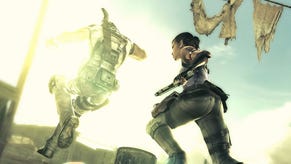Resident Evil Zero
Is it Evil for the right reasons? Kristan finds out...
Let's cut to the chase straight away: you'll either love Resident Evil or you'll hate it, and most of you will already have your mind made up about the fifth in the zombie-slaying series before you've even clapped eyes on it. Whatever your allegiance, there are fundamental truths about this series that remain as relevant today as they did way back in 1996.
Firstly, even if you've never played a Resident Evil title before, you'll know that it involves killing a procession of zombies, and that horror lies around every darkened, blood-drenched corner. The checklist for any RE title is pretty predictable; a darkened, brooding mansion setting (tick), an endless succession of locked doors (tick), ammo and weaponry curiously discarded (tick), typewriters that allow you to save your progress (tick), drawn out door/stair climbing animations (tick), delicious pre-rendered backdrops (tick), 'suspenseful' camera angles (tick), 'spin on the spot' control system (tick), and bastard hard (tick). Yes, playing Resident Evil Zero is the gaming equivalent of popping on a battered old pair of slippers. You know it's a bit holey, well past its best, but it's got that lived in cosiness.
It would be pointless trying to convince you that this is some kind of wild revolutionary update. It isn't. Capcom has followed the strict 'if it aint broke…' school of thought to the letter. While this is undeniably frustrating when there are so many areas that could be improved, there's still a certain magic about these games that somehow enables you to leave your cynical baggage outside.
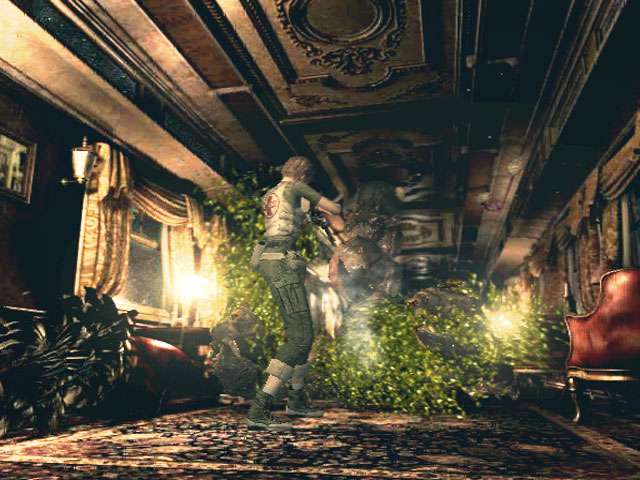
Admit it Capcom, you nicked this one
Given that Capcom more or less stole the concept and gameplay mechanics wholesale from Infogrames' Alone In The Dark trilogy, you could argue that the fundamentals of the survival horror genre haven't moved on a great deal in over ten years. But should we be any less excited about the latest episode in the world's favourite horror series? Of course not. This is, after all, the first 'all new' Resident Evil game in three years; a prequel to the very first game in the series that goes some way to filling in the blanks regarding the origins of some of the series' evil do-ers.
So the story begins; it's 1998. Several bizarre murders have occurred in Raccoon City, with groups of 'people-eating' zombies attacking civilians. The elite S.T.A.R.S (Special Tactics And Rescue Service) team have been sent to investigate, but their helicopter is forced to make an emergency landing after experiencing engine trouble. The game kicks off after the team discovers an abandoned train, with the 18-year-old Rebecca Chambers pressed into action.
The first thing to note is the breathtakingly detailed graphics. Anyone who saw the Resident Evil remake (released last September) will know what to expect, and thanks to the use of static camera angles, and some cunning trickery, the environment is easily one of the best realised in gaming history. Every location is a festering, dank, gloomy hellhole, and very quickly you're plunged into an atmosphere of such fetid, rank vileness it makes your worst nightmares seem like a welcome relief. One of the key factors is Capcom's subtle use of animation in the static, pre-rendered backgrounds, creating a far more believable setting than ever before. Add in superb light/shadowing and delightfully spooky sound effects and you've got a supremely solid set of foundations for the game itself.
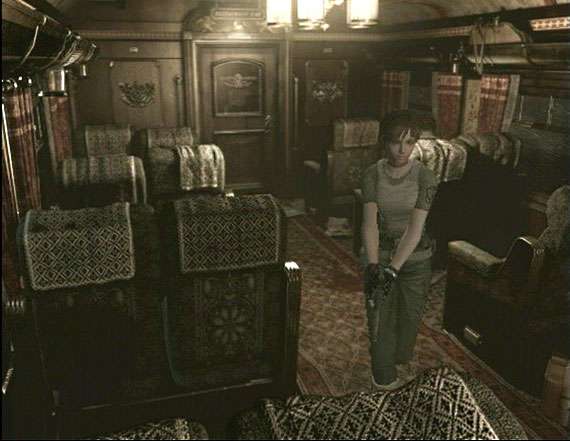
Zap me up before you go-go
Aside from the obvious visual enhancements, RE0 introduces a 'partner zapping' dynamic, in which you're able to dynamically switch between the two main characters in order to successfully progress. Shortly after the game starts, the nubile Rebecca bumps into vest-wearing, mulleted ex-Marine Billy Cohen, a fugitive accused of the murder of 23 people. After initially disappearing, Cohen then helps Chambers out of a sticky situation and from then on you're largely working as a team.
To begin with, your partner merely provides combat assistance in the inevitable zombie battles, but inevitably you're forced to split the pair up in order to overcome the many puzzles that would otherwise be impossible on your lonesome. More so than ever before, inventory management is all important. Sending one of the characters out alone without the necessary object or weapon will quickly result in failure, and a lengthy trudge back to find your partner. In a sense, this insistence on working together is utterly contrived, but you soon slip into the game's way of thinking. Can't get to your partner? Why not pop an object in a handy chute that just happens to be in the room where they're stuck?
The puzzle solving is, for the most part, fairly logical and straightforward - but even when you know what the solution is, the chances are the game will throw a bunch of evil minions in your way as a barrier to progress. And it's the combat element of the game that will really hold you up; for a start the weapons aren't that powerful, and ammunition is scarcer still. As veterans to the series will bitterly recount, preserving your ammo and health is almost the most important aspect of the game. It really is a battle for survival, and requires you to constantly gamble on your abilities to make it to the next section. Take too much damage and you may find the section after impossible to get past. Do you dodge your enemy and save your ammo, or blast them and risk not having the tools to take out the really powerful boss that's coming up? The trouble is, unless you're playing it with a guide, you'll never know when the next ridiculously powerful boss is coming up. By the time you've reached your nemesis, the chances are it's too late: not enough health and probably not enough powerful weaponry either - or worse, you've left the weapon you need behind. As ever, RE0 forces the player to constantly walk a tightrope, and adds a rich element of tension thanks to its difficulty level.
Matters aren't helped, in the main, by the age old problem of the camera. Although the game does its bit to ensure you're given a prime view, it doesn't always work out. When things get really tricky you often flail around in a panic, desperately trying to get a good lock onto your intended target. Hitting R aims the weapon at your nearest target, but half the time you'll be firing blind, as your target will be off screen. Also, you'll often be presented with multiple targets. Some many be on screen, some off. Sometimes you'll be caught totally off guard as a result, or your view will suddenly change, and you'll end up engaged in lengthy tussle, resulting in your health taking a major pummelling.
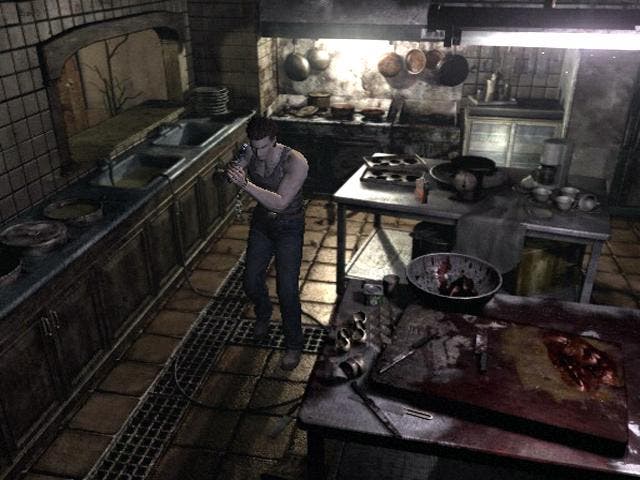
Take it easy or the road ahead will be a hard one
Of course you learn to adapt to these foibles, and as a result take things extremely carefully, but the lasting impression is that you're not to blame for half the things that go wrong - rather it's the combination of the tricky control system (slow rotation left/right with forwards and backwards), the extreme lack of health boosts and chronic shortage of ammo. Compounding these issues is the AI's tendency to be completely unhelpful. Not only will your partner be utterly profligate with their ammo but, worse still, may even end up injuring the player you're in control of - especially if you make the mistake of arming them the utterly useless Molotov Cocktails. In certain situations, such as tight corridors, you're usually better off leaving them in another room where they can't be a nuisance, and given that we've spent years duking it out on our lonesome, this doesn't prove to be a significant disadvantage.
With such constant overwhelming odds, you often wonder why you're bothering. It's like part of the 'Evil' of the game is to make you suffer wherever possible. But somehow the atmosphere, the environments and the against the odds combat is so engrossing that you find yourself refusing to be beaten by something as insolent as a mere videogame. Even the rather tenuous back story starts to make sense of a sort, and you'll find yourself exclaiming 'ahaaaas' at various points at the background justification of some of the game's evil henchmen that appear later on in the series.
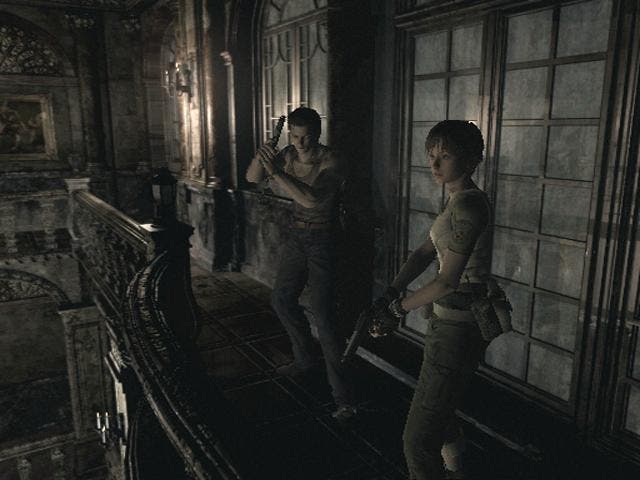
The bitch is back
There really is no logic to how you score a Resident Evil game. Your critical head says one thing; your gaming heart says another. On a basic, technical level you're tempted to give it a kicking for all manner of niggly reasons, which every review of every RE in the past seven years will have picked up on each and every time. But where it scores above other games is simply the emotions it inspires. For every time the game pisses you off, you're straight back in there vowing to avenge this injustice, nursing your fragile characters through one by-the-seat-of-your-pants encounter after another. It's not so much that the creatures are even that scary. If you've seen one slimy, multi-tentacled beast, or staggering, moaning creature of the undead, you've pretty much seen them all, but their unrelenting evil is unquestionable.
Somehow the Resident Evil experience is much more than the sum of its parts, and the deeper you get into each episode of the game, the more its sucks you into its macabre offering. For the unbelievers, it's doubtful RE0 will offer anything that could persuade you to join the series at this late stage. For the rest of you, Zero is one of the most evil games we've ever come across. Take that as a compliment.









